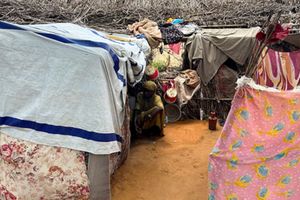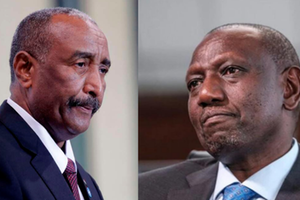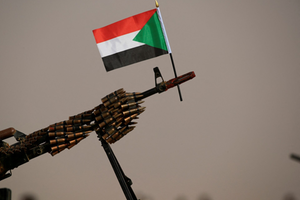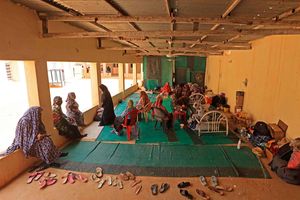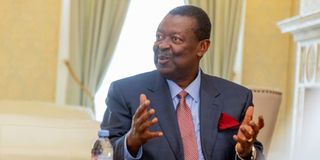
Prime Cabinet Secretary Musalia Mudavadi on April 14, 2025 during a meeting with a US delegation on the sidelines of the London-Sudan Conference.
Kenya now wants the international community to consider sanctions on the leaders of the warring groups in Sudan accused of obstructing humanitarian aid.
The call came even as Kenya battles accusations of taking sides in the conflict – Nairobi has been accused of supporting the Rapid Support Forces (RSF), a paramilitary faction fighting to oust the Khartoum military regime.
In February, the Sudan Armed Forces (SAF), through the Foreign Affairs ministry, recalled its ambassador to Kenya, Kamal Jabara, citing Nairobi’s decision to host meetings of opposition groups, including the RSF. The junta deemed Kenya’s decision a violation of Sudan's sovereignty and national security.
Prime Cabinet Secretary Musalia Mudavadi said there is need for increased international pressure on the leaders of warring factions in Sudan to avert a humanitarian crisis.
He said the priority should be on resolving the dire humanitarian situation facing the Sudanese population.
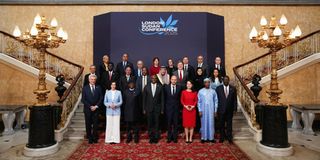
Participants at the London-Sudan Conference on April 15, 2025.
Mr Mudavadi, who is also Kenya's Cabinet Secretary for Foreign and Diaspora Affairs, said vast areas that are not under the control of the Sudanese army are the most affected, with limited access to humanitarian aid, and must be given keen attention.
“We need to begin pressurising or sanctioning and declaring clear consequences for those who continue to obstruct the work of humanitarian agencies,” the CS said during the London-Sudan Conference, at Lancaster House.
He lamented that the Sudan conflict, which many hoped would be resolved soon, was now entering its third year.
"The parties appeared to be holding to the position that a military solution was possible," Mr Mudavadi said. However, “the humanitarian situation continues to deteriorate, with a huge number of forced displacements, making Sudan the world's largest internal displacement crisis."
He noted that the most affected are Sudanese who cannot afford to move to safer places "internally and transnationally".
Mr Mudavadi observed that the human cost of the conflict had increased, and civilian protection was weak as populations continue to be victims of indiscriminate shootings and bombardments.
Women and girls, he said, continued to face risks of conflict-related sexual violence, and children were subjected to widespread abuse and exploitation.
“Despite ongoing humanitarian efforts, there are still severe access constraints, particularly in active conflict zones, and funding constraints continue to hinder aid delivery where it is needed most,” the CS said, adding that, “We are deeply concerned about the plight of the displaced populations and will remain focused on supporting humanitarian assistance.”
He said Kenya would continue facilitating the humanitarian supply logistics through the country.
The CS also urged the international community to step up coordinated efforts to alleviate the humanitarian crisis. “As a country, our long-held belief is that indifference to regional conflicts is never an option. Our security and prosperity are interlinked with that of our neighbours, making regional stability central to our foreign policy.”
Mr Mudavadi said that is why, on April 17, 2023, three days after the hostilities started in Khartoum, Kenya worked through the Intergovernmental Authority on Development (Igad) to convene urgent meetings at the Heads of State level.
“Further, bilaterally, Kenya has welcomed every key Sudanese stakeholder from both sides of the divide, including top Sudan Armed Forces (SAF) and Rapid Support Forces (RSF) leaders, special envoys for the parties, representatives of local communities, civil society, political parties, and armed movements,” he said.
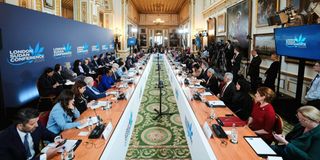
Participants at the London-Sudan Conference on April 15, 2025.
In November 2023, Kenya hosted General Abdel Fattah al-Burhan, the President of the Sudan Sovereignty Council and Commander-in-Chief of the Sudan Forces, in Nairobi to discuss peace efforts. And in January 2024, it hosted RSF leader, Lt. Gen. Mohamed Hamdan Dagalo, to advance the matter of peace in Sudan.
Further to that, Mr Mudavadi said, Sudan’s Minister for Foreign Affairs, Amb Ali Youssef, visited Nairobi in January 2025 and held meetings with President William Ruto to seek a way forward on regional efforts to address the dire situation in Sudan.
“Equally, in February 2025, a group of political, civilian, and military Sudanese stakeholders held a meeting in Nairobi to agree on an organised unified structure that helps parties to engage and generate a common position to salvage Sudan,” he added.
Kenya, he told the Conference, was not part of the Nairobi talks (Tasis) and did not sit in the discussions because it believed that “Sudan belonged to the Sudanese people” and they have their own solutions.
“Looking at the outcome documents of the meeting in Nairobi, we found that there was neither a parallel government nor a government in exile for Sudan that was formed in Nairobi. The reference to the right to self-determination in the Political Charter and Transitional Constitution is considered a democratic safeguard rather than a call for secession,” Mr Mudavadi said.
Kenya continued to adhere to the UN Charter and the AU Constitutive Act, particularly the principles of non-interference, respect for sovereignty, and territorial integrity of states.
Mr Mudavadi said that the Nairobi meeting was not a military or RSF-only conference, and that there were more than 24 political and civilian organisations, reflecting the diversity of Sudan.
The PCS said Kenya has strongly and consistently advocated for the peaceful resolution of conflicts.
“The conflict in Sudan may not end any time soon if we continue prioritising military solutions. We need to start shifting focus from military attention to embrace a peace process that reflects the diversity of the Republic of Sudan. This includes bringing together the military groups, civilians and political parties, among other stakeholders,” he said.
Kenya does not support of dismembering or balkanisation of sovereign states, but instead supports a unified Sudan for the people of Sudan and has advocated for a Sudanese-led and Sudanese-owned political process as the best sustainable path to addressing the country’s challenges, Mudavadi argued.
The future of Sudan, the CS said, must be determined by the Sudanese people themselves, through inclusive dialogue, and external actors can play a supportive role. But the ultimate responsibility lies with the Sudanese people.
“We must start thinking about creating concrete structures that would address the root causes of the conflict and usher in democracy and rule of law. We need to confront the challenge of multiple and parallel peace initiatives that impair commitment.
Without collective peace, the PCS said, the net effect of partial negotiations is partial solutions.
Mr Mudavadi said there was a need to mainstream the several peace tracks in Sudan into an African-led process that is supported by the international community.
“We welcome the other efforts aimed at pacifying Sudan, while also advocating for a unified and coordinated response from all, including Igad, the African Union, the Arab League, the United Nations, and the broader international community, but we need to mainstream into an African-led process,” he added.
The Kenyan minister commended the organisers of the London Sudan Conference for bringing greater global attention to the Sudan crisis and urged the world to remain steadfast in raising international attention to the humanitarian crisis in Sudan, including internal displacement, the protection of civilians and the regional impact of the conflict on neighbouring states, including Chad, South Sudan, Ethiopia and Kenya.
“I underscore the need for consolidating the several peace tracks in Sudan into a well-coordinated and harmonised process preferably under the African Union and driven by the Intergovernmental Authority on Development (Igad), with the support of the United Nations,” said Mr Mudavadi.
He thanked David Lammy, the UK’s Secretary of State for Foreign, Commonwealth, and Development Affairs, for inviting him to the Conference.

